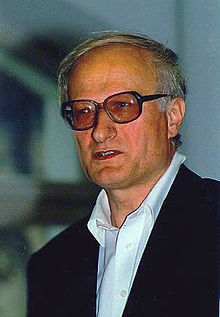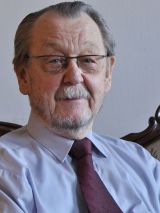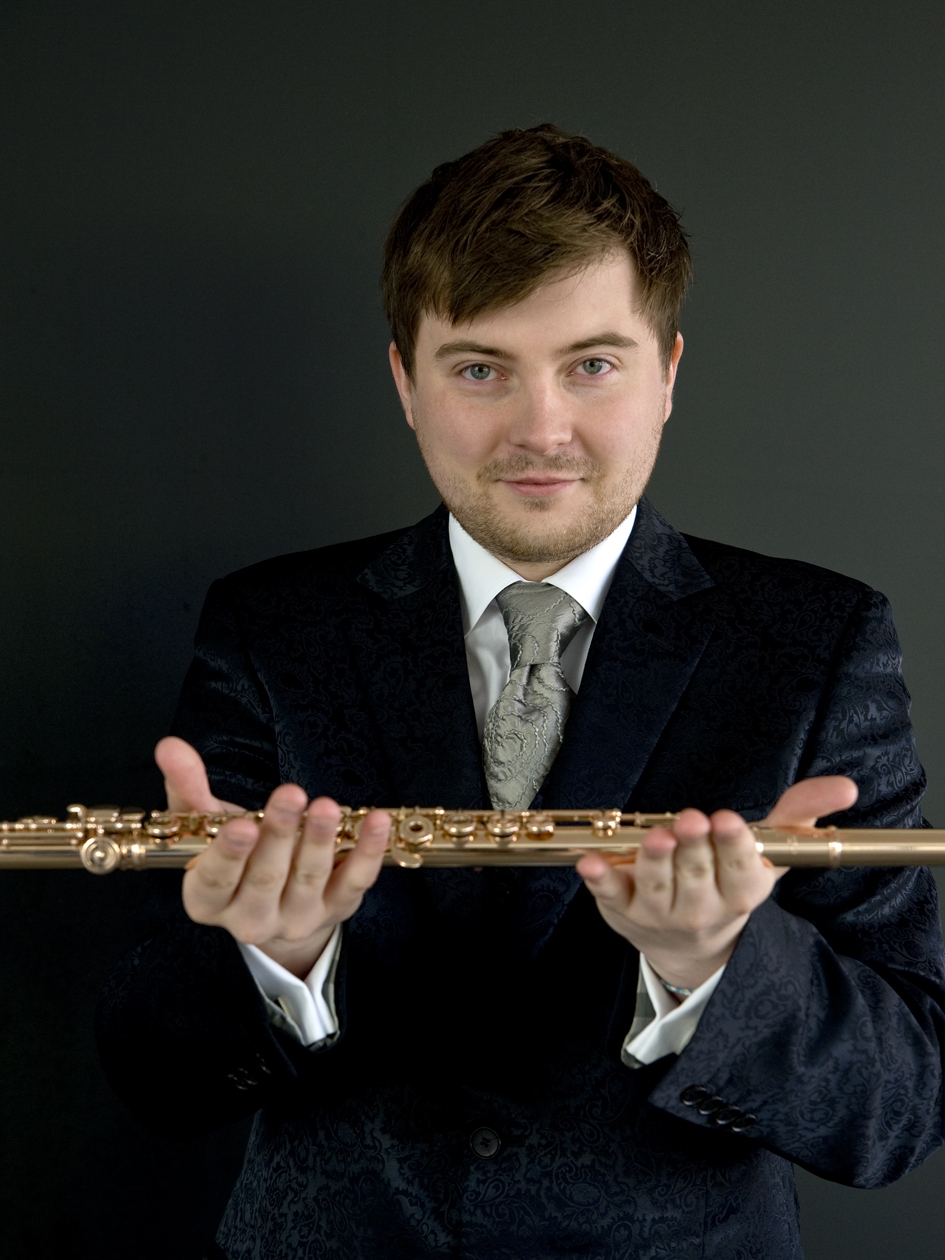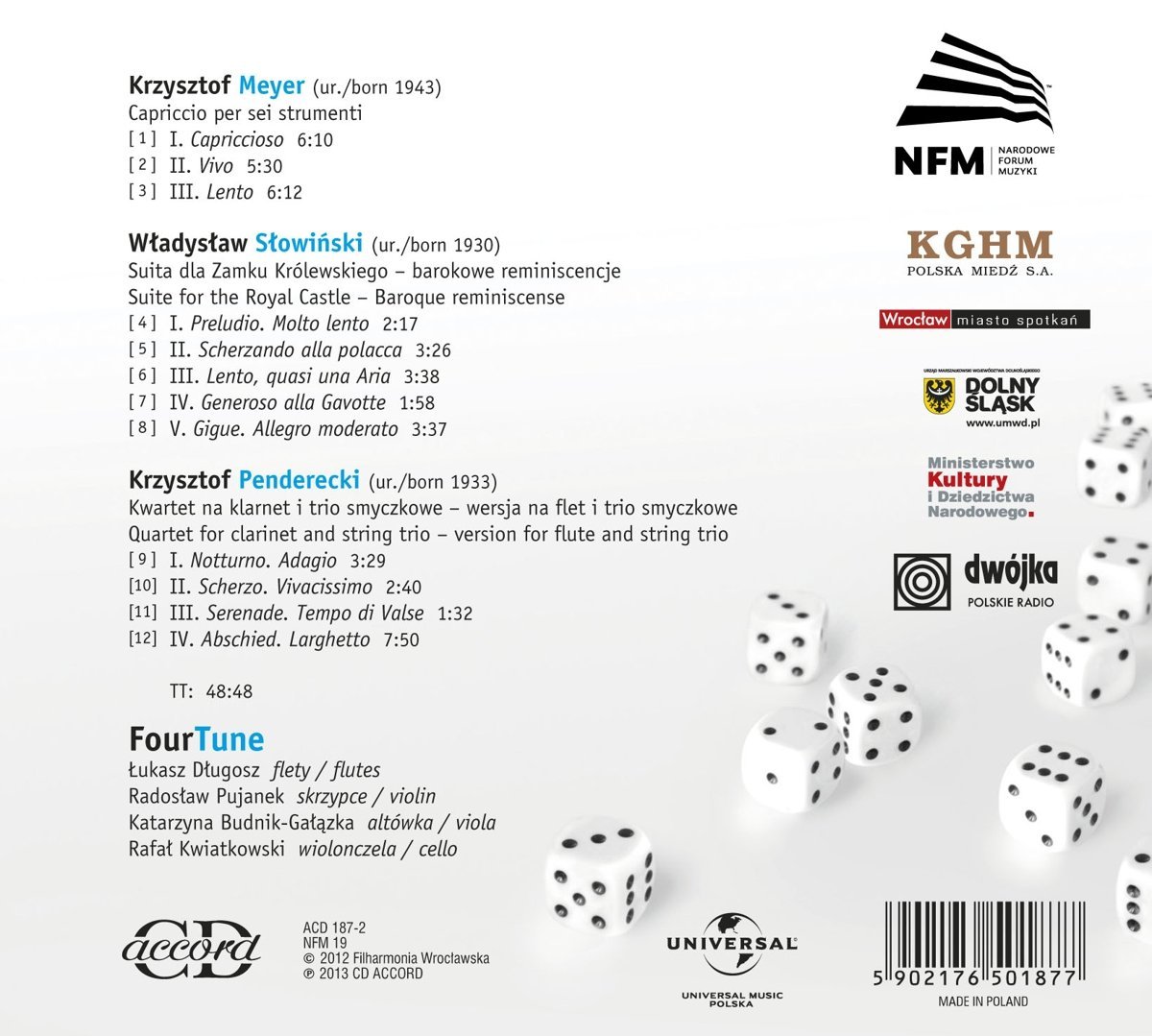Share This
Album at a Glance
Tags
Related Posts
FourTune: Polish Flute Quartets of K. Meyer, Slowinski and Penderecki
Posted by Elaine Fine on Jun 9, 2015 in Contemporary | 0 comments
FourTune is an ensemble of excellent Polish musicians who have put together a terrific program of later 20th-century Polish music for flute and string trio. The flute is clearly the soloist in Krzysztof Meyer's Capriccio per sei strumenti, written in 1987 and 1988. The piece is a wonderful study in color, texture, and contrast, with a first movement rhapsody of differently-textured episodes that uses the alto flute, and a second movement that pairs the standard C flute with single string voices. There is a particularly lovely section in the middle of this movement for strings alone. Meyer highlights the dark lower register of the piccolo (which is still high by string standards) in the third movement, and makes intriguing comparisons and contrasts between the piccolo and the violin's E string.
Wladyslaw Słowiński wrote his neoclassical Suita dla Zamku Krolewskiego (Suite for the Royal Castle) with the subtitle “Baroque Reminiscence” (1996) to celebrate the rich musical history of the Royal Castle in Warsaw.
The five movements of his Reminiscense include an alla polocca that recalls the neoclassism of Reger, Richard Strauss, and Stravinsky. There is an aria that suggests colors found in Bach's Cantatas and gently nods in the direction of Poulenc. It is highly appropriate that Słowiński gives his final Gigue a Mazurka-like rhythm.
Krzysztof Penderecki's 1993 Quartet for Clarinet and String Trio is a masterpiece. His transcription for flute and string trio changes the feeling of the piece entirely, but does not compromise its quality in any way. While the clarinet tends to contrast with the strings in the original version, the flute tends to blend with the strings. The strings here seem to enjoy matching the flutist's very lovely vibrato, something that is not possible when playing the clarinet version since clarinetists use vibrato sparingly. Because the flute has a lighter staccato than the clarinet, the Scherzo movement is much lighter and more playful here in the flute version. I love the way the Viennese Serenade movement, written with an ear for Schoenberg's early atonal writing, sounds on the flute; and I find the final Larghetto especially moving.
This is an exceptional recording of unusual and interesting music.
Chamber music accounts for over half of Krzysztof Meyer’s contribution, which consists of works for time-honoured traditional forces – most notably among them 13 string quartets, two quintets (clarinet and piano) and trios (piano and string) – as well as for less common instrumental pairings like his flute quartet Capriccio per sei strumenti composed in 1987–88.
A clue to the work’s form and character is contained in the first word of the title as explained by the composer is his written commentary: “this is a work of a freely interpreted fantasy genre, as defined by the great 17th century music theorist Praetorius. This form enabled me to develop music through a loose juxtaposition of separate episodes which thanks to their nature endow the work with a capricious character.” The second part of the title – per sei strumenti – serves to further define the instrumental forces, since the flautist plays three various flutes: in the first movement an alto flute, in the second a standard concert flute and in the third a piccolo. Yet in reality both terms are somewhat misleading, as the work’s formal structure is precisely arranged while the question of instrument numbers is other than it appears to be. For the “number” of string instruments ought to be multiplied as their varied articulation contributes to the work’s palette of tone colour in no lesser degree than flute changes.
Music composed by Władysław Słowiński follows in neoclassical traditions – of works with clarity of form, expanded tonal harmony, sometimes with humoristic elements, often however drawn from earlier styles. In the case of Suite for the Royal Castle it is fully justified by the circumstances of its creation. A dedication to the Royal Castle was intended as an expression of gratitude for regular accessibility to one of the castle’s chambers as a venue for annual concerts of the Warsaw Music Encounters – a festival founded in 1986 by Władysław Słowiński.
Krzysztof Penderecki’s creative output is primarily associated with large forms – oratorios, operas, symphonies and instrumental concertos, with a far more modest contribution to chamber music. There are only two string quartets from his avant-garde period with more numerous works in Romantic style written during his later years: String Trio, Sonata No. 2 for violin and piano, Serenata for three cellos, Sextet and String Quartet No. 3. Quartet for clarinet and string trio, on this CD recorded in a version for flute, also belongs to this group and furthermore exists in an authorial transcription for clarinet and string orchestra as Sinfonietta No. 2 and – on the composer’s suggestion – for saxophone quartet.
In one of his interviews the composer admitted that his source of inspiration for writing this work was the atmosphere generated by Schubert’s String Quintet during a concert in the Swiss resort of Evian. Initially he sketched it “for himself” without any concrete plans, but the work was finally composed when commissioned by the Schleswig-Holstein Festival. The work received its festival premiere on 13 August 1993 in Lubeck with the participation of Sharon Kam (clarinet), Kim Kashkashian (viola) and Boris Pergamenschikow (cello).
As often happens, the composer worked on the piece till the last moment and lack of time prevented him from realizing his initial concept of a large-scale seven-movement work. Only four movements were composed: I. Notturno (Nocturne), II. Scherzo, III. Serenade, IV. Abschied (Farewell), whose titles – according to Penderecki – are meant to evoke images of Vienna. The fact that the work was to have been far more expansive gave rise to the length and dramaturgy of these four movements designed as a set on a grander scale.
With his Suite subtitled “Baroque reminiscences” the composer wished to pay homage to a venue, which played a seminal role in the history of Polish culture. Hence the work contains so many allusions to early music where a desire to arouse certain associations is clearly discernible. The suite consists of five movements played attacca of which three are stylizations of 18th century dances and one a reference to the Royal Castle’s “golden age” of music. The performance forces may also be treated as fit for purpose, indeed flautists often willingly relate that Stanisław August Poniatowski used to play their instrument.
 Krzysztof Meyer |
Krzysztof Meyer, composer Krzysztof Meyer (born 11 August 1943) is a Polish composer, pianist and music scholar, formerly Dean of the Department of Music Theory (1972–1975) at the State College of Music (now Academy of Music in Kraków), and president of the Union of Polish Composers (1985–1989). Meyer served as professor of composition at the Hochschule für Musik in Cologne from 1987 to 2008, prior to retirement. In his early compositions (String Quartets Nos. 1–4, Symphonies Nos. 1–3), Meyer experimented with unconventional sonorities, typical of the Polish avant-garde music in the 1960s. He used twelve-tone technique, albeit freely, as well as aleatoric technique and collage. All these means appear in his first opera Cyberiada, to a science-fiction libretto after Stanisław Lem’s The Cyberiad. The style of Meyer’s later works reflects his interest in tradition; even his use of titles such as “string quartet,” “sonata,” “concerto,” and “symphony” are indicators of the traditional trend in his aesthetic. Source: Wikipedia
____________________________________________________________
|
|
Krzysztof Penderecki |
Krzysztof Penderecki, composer Krzysztof Eugeniusz Penderecki (born 23 November 1933) is a Polish composer and conductor. The Guardian has called him Poland’s greatest living composer. Among his best known works are his Threnody to the Victims of Hiroshima, St. Luke Passion, Polish Requiem, Anaklasis, four operas, eight symphonies and other orchestral pieces, a variety of instrumental concertos, choral settings of mainly religious texts, as well as chamber and instrumental works. Born in Dębica to a lawyer, Penderecki studied music at Jagiellonian University and the Academy of Music in Kraków. After graduating from the Academy of Music, Penderecki became a teacher at the academy and he began his career as a composer in 1959 during the Warsaw Autumn festival. His Threnody to the Victims of Hiroshima for string orchestra and the choral work St. Luke Passion, have received popular acclaim. His first opera, The Devils of Loudun, was not immediately successful. Beginning in the mid-1970s, Penderecki’s composing style changed, with his first violin concerto focusing on the semitone and the tritone. His choral work Polish Requiem was written in the 1980s, with Penderecki expanding it in 1993 and 2005. During his life, Penderecki has won several prestigious awards, including the Commander’s Cross in 1964, the Prix Italia in 1967 and 1968, the Knight’s Cross of the Order of Polonia Restituta in 1964, three Grammy Awards, in 1987, 1998 and 2001, and the University of Louisville Grawemeyer Award for Music Composition in 1992. Source: Wikipedia ____________________________________________________________
|
 Władysław Słowiński |
Władysław Słowiński, composer Władysław Słowiński is a Polish composer, conductor and arts administrator born in 1930 in Sadlno. From 1949-51 he studied musicology with Adolf Chybiński at Adam Mickiewicz University in Poznań; thereafter he undertook studies in composition composition with Tadeusz Szeligowski and in conducting with Walerian Bierdiajew and Stanisław Wisłocki in the State Higher School of Music in Poznań.
Source: www.wsm.art.pl
____________________________________________________________
|
 Łukasz Długosz |
Łukasz Długosz, flute Polish-born flutist Lukasz Dlugosz studied at the Hochschule für Musik und Theater in Munich, the Conservatoire National Supérieur de Musique et de Danse in Paris and at Yale University in New Haven. He performs as a soloist in Europe, Japan, China and USA and has played with famous conductors such as Zubin Mehta, Krzysztof Penderecki, Mariss Jansons, and Helmuth Rilling. Mr. Dlugosz has performed Krzysztof Penderecki’s Flute Concerto under the baton of the composer several times. In January 2010 he made his debut with the London Symphony Orchestra and made a recording of Michael Colina’s Flute Concerto. He has made several recordings for Polish, German and French Radio Stations. He has also recorded for SONY, NAXOS, CPO, DUX, Fleur De Son. Source: http://sankyoflutes.com/sankyo-artists/lukasz-dlugosz ____________________________________________________________
|
|
Radosław Pujanek |
Radosław Pujanek, violin Radoslaw Pujanek is a graduate of violin classes in the School of Talents and Academy of Music in Poznan, under Professor Bartosz Bryla. He also received his post-graduate training at Academy of Music under Prof. Iwona Wojciechowska. He won special prize and scholarship of the Foundation of Talents Promotion during the 4th International Karol Szymanowski Competition in Lodz, 3rd place and the prize of the President of Polish Television at all-Polish Young Violinist Competition in Lublin. He has performed extensively both as a solo artist and in many acknowledged ensembles, for example: Sonoris Quartet, Pro Arte Novum, Orchestre de Musique Legere, and the string ensemble supporting Goran Bregovic performances. Currently, he is a member of Chamber Orchestra of Polish Radio conducted by Agnieszka Duczmal, and maintains a busy teaching schedule. Source: http://www.pujanek.com/gb/exodus1.html ____________________________________________________________
|
|
Katarzyna Budnik-Gałązka |
Katarzyna Budnik-Gałązka, viola Violist and violinist Katarzyna Budnik-Gałązka graduated from the Fryderyk Chopin University of Music in Warsaw after studies in the violin class of Mirosław Ławrynowicz, Andrzej Gębski and Janusz Wawrowski as well as the viola class of Piotr Reichert. She is now on the faculty of the University of Music in Warsaw as a teaching assistant in Piotr Reichert’s viola class. In recognition of her outstanding achievements, she received scholarships from the Ministry of Culture and National Heritage. As a soloist and chamber musician she has given concerts in Poland and other European countries (e.g. in the Czech Republic, Austria, Germany, France and Russia). In 2010 she participated in the “Chamber Music Connects the World” project, organized by the Kronberg Academy, where she performed along with such distinguished musicians as Gidon Kremer, Tatiana Grindenko, at many prestigious festivals, including the Music Festival in Łańcut, the International Chamber Music Festival “Music on the Heights“ in Zakopane and the Kammermusikfest Lockenhaus (she was specially invited to the latter event by Gidon Kremer). Source: http://www.cdaccord.com.pl/artist.en.html?id=166 ____________________________________________________________
|
|
Rafał Kwiatkowski |
Rafał Kwiatkowski, cello Born in 1978 into a musical family, Rafał Kwiatkowski began his cello studies at the age of seven. From 1993 to 1994 he studied cello and chamber music in Baltimore under Cecylia Barczyk, followed by a period of study with Andrzej Orkim in Warsaw, where in 2002 he graduated from the Fryderyk Chopin Academy of Music, receiving the medal magna cum laude. The winner of many competitions for young musicians, both in Poland and the United States, including those in Baltimore in 1993 and in Cincinnati in 1994, he has appeared in North and South America, Africa and Asia, in addition to his acclaimed concert performances throughout Europe. In 2000 his acclaimed début with the Warsaw Philharmonic under Stanisław Skrowaczewski led to participation in the orchestra’s international tours and a recording of Witold Lutosławski’sCello Concerto, which won two Fryderyks, the award of the Polish recording industry. He performed Penderecki’s Viola Concerto under the composer’s baton (Berlin, 2001) and a few months later took part in the Polish première of Penderecki’s Concerto Grosso. Since then he has been regularly invited by Penderecki to perform his works in Poland and abroad, as well to record them. Rafał Kwiatkowski was the soloist at the symphony concerts in Copenhagen, Helsinki and Basel that promoted Polish culture on the occasion of Poland’s entry into the EU. He is currently on the faculty of the Music Academy in Warsaw. Source: Naxos |
![]() About Elaine Fine
About Elaine Fine
Twitter •
| Thinking about purchasing this album?
Follow this link for more album details or to make the purchase. Buy it now |
“Not just recommended. Guaranteed.”
We stand behind every album featured on Expedition Audio. Our objective is to take the monetary risk out of music exploration. If you order this album from HBDirect.com and do not like it you can return it for a refund.
Krzysztof Penderecki: Concerto per pianoforte e orchestra (2001/2002)






